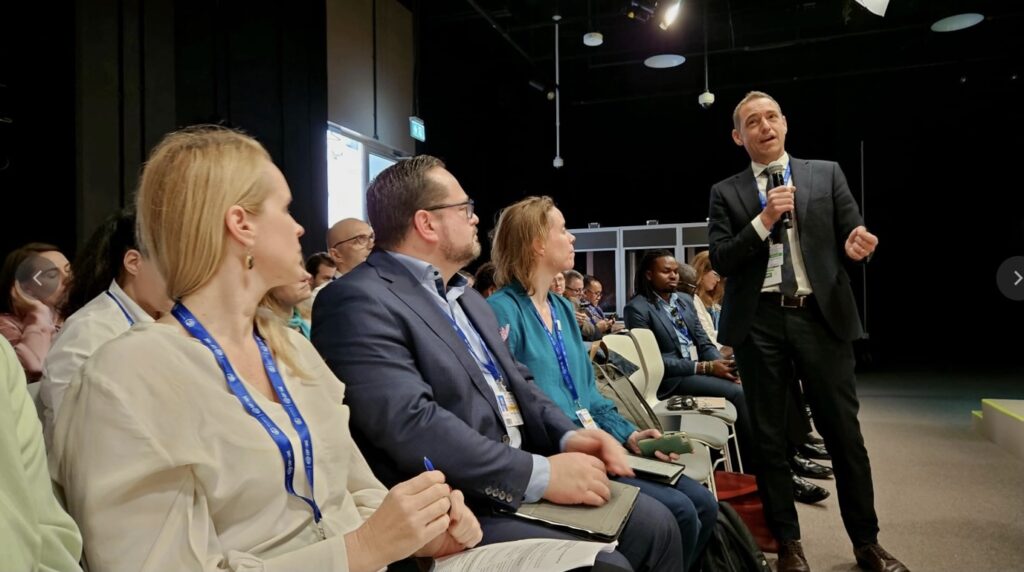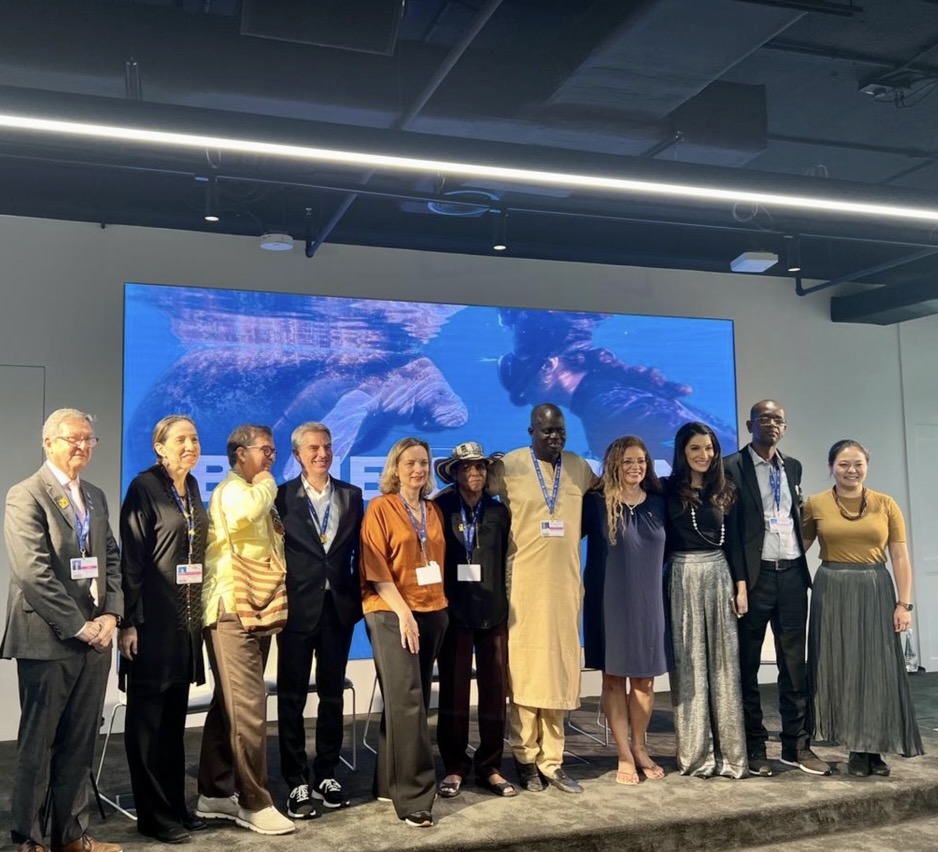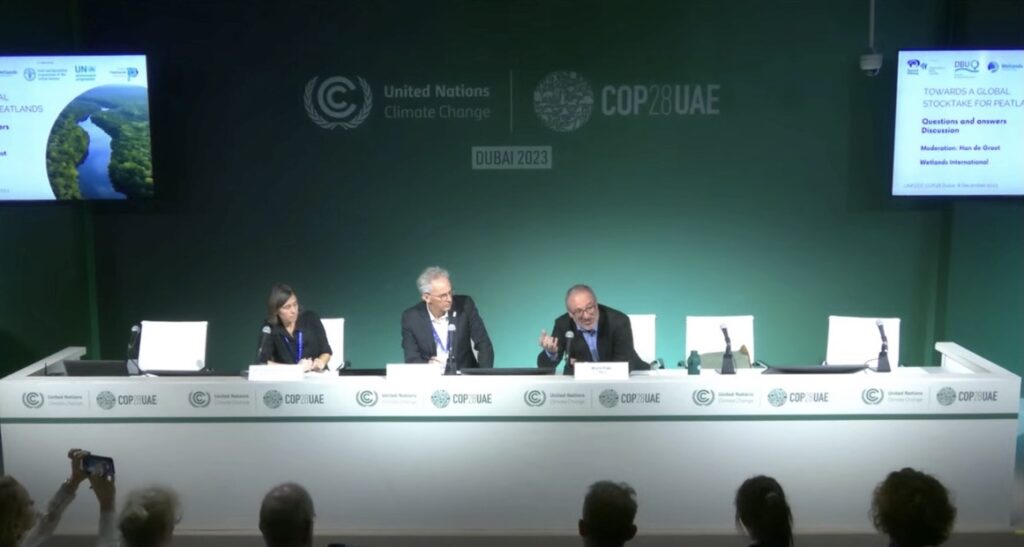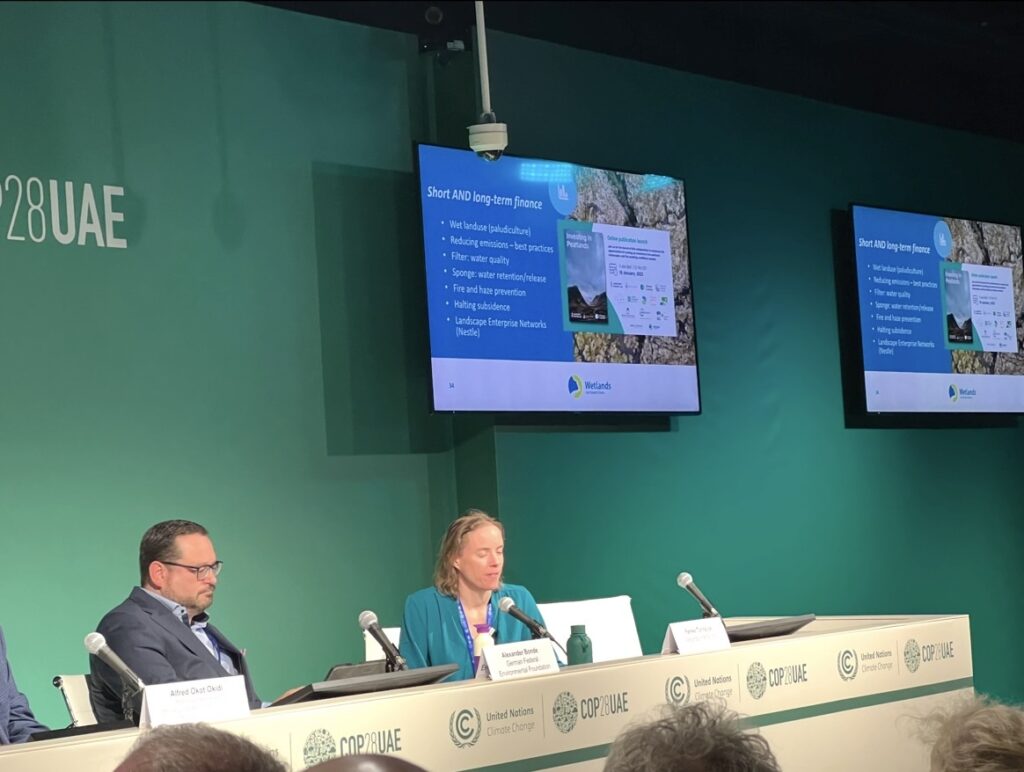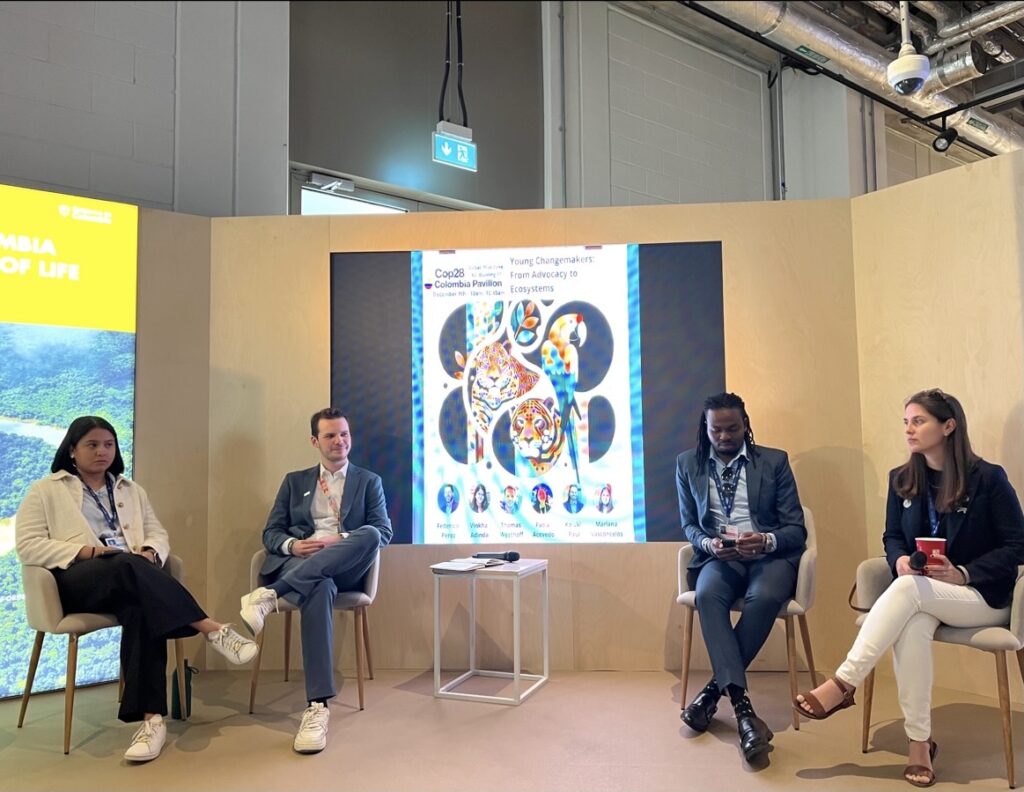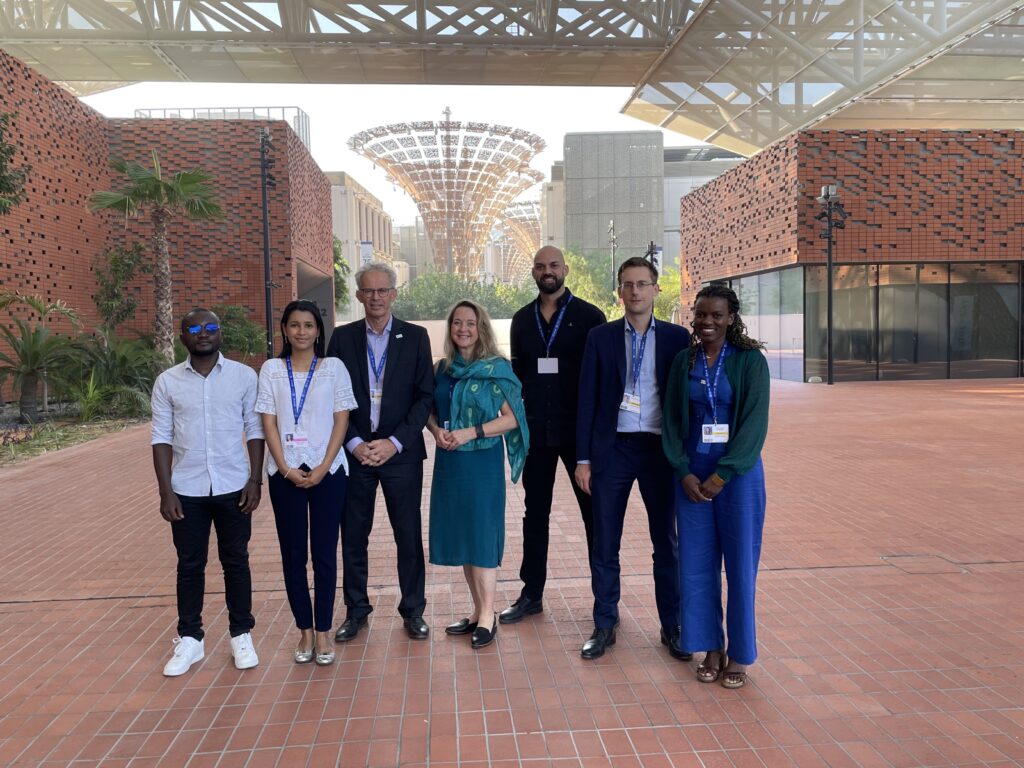
Wetlands are at the heart of solving the biggest global challenge of our time
COP28 saw promising progress in recognising the importance of the natural world and nature-based solutions. Alongside the need for a rapid and just fossil fuel phase-out, solving the climate crisis means safeguarding and restoring nature – including natural “carbon sinks” such as mangroves, peatlands and other wetlands. We urgently need to do this on a scale never seen before.
Read our op-ed published by Asia Times, co-authored with Musonda Mumba, Secretary General of the Convention on Wetlands.
Healthy freshwater ecosystems are critical to mitigating and adapting to climate change. They are the foundation for a water-resilient future. Peatlands are the world’s largest terrestrial carbon store, while river sediment deposited on the sea floor can also sequester large quantities of carbon. Connected floodplains and healthy wetlands can reduce the impact of extreme floods and build resilience to ever increasing droughts.
Thriving mangroves – most of which depend on sediment flow from rivers to survive – help protect coastal communities from storm surges. Densely populated and agriculturally rich deltas also rely on the flow of water, nutrients and sediments down rivers to limit saltwater intrusion, remain fertile, and stay above the rising seas.
Yet one-third of the world’s wetlands have been lost over the past 50 years, and we are still losing them faster than forests. Rivers and lakes are the most degraded ecosystems in the world and climate change is now exacerbating the already unprecedented threats. Along with accelerating climate action, restoring and protecting healthy freshwater ecosystems will also boost water, food and energy security, enhance peace and stability, reverse nature loss and drive sustainable development.
Water and Water-related Ecosystems in COP28 Outcome
In a positive move for wetlands around the world, water and water-related ecosystems were included in the outcome of the first global stocktake, which recognises the critical role of protecting, conserving and restoring water and water-related ecosystems in delivering climate adaptation benefits and co-benefits, while ensuring social and environmental safeguards.
It’s a step forward towards reducing climate impacts on ecosystems and biodiversity, and accelerating the use of ecosystem-based adaptation and nature-based solutions, including restoration and conservation of inland water and coastal ecosystems.
Read our statement here.
A breakthrough moment for mangroves
Mangroves were in the spotlight on Nature Day at COP28. Mangroves can sequester four times as much atmospheric carbon as rainforests and protect coastlines from storm surges and rising sea levels. Inspired by Global Mangrove Alliance – of which we are a member – and its State of the World’s Mangroves report, the Mangrove Breakthrough aims to restore and protect 15 million hectares of mangroves, and to halt mangrove destruction by 2030 by unlocking USD 4bn of sustainable finance. 49 governments (representing around 60% of the world’s mangroves) and over 50 non-state actors supported the initiative, and political momentum has never been higher to realize mangroves’ massive potential.
Earlier in the week the Global Mangrove Alliance launched the Mangrove Breakthrough Financial Roadmap, which offers a practical roadmap to scale up capital flow into mangrove protection and restoration. Co-developed with investors, experts and practitioners, the Roadmap provides actionable recommendations for scaling mangrove-positive business models and developing innovative financial instruments to accelerate investment in mangroves.
Freshwater Challenge – a COP28 water outcome
More than 38 countries signed up to the Freshwater Challenge, the world’s largest initiative to restore degraded rivers, lakes and wetlands and to protect vital freshwater ecosystems. A country-led initiative, it aims to restore 300,000 km of degraded rivers and 350 million hectares of degraded wetlands by 2030, while conserving intact freshwater ecosystems.
Ministers from Africa, Asia, Europe, North and South America made bold statements in favour of the role of freshwater ecosystems as allies in the fight against climate change at a Ministerial Roundtable hosted by the COP28 Presidency. Their added commitment should, in turn, give impetus to other world leaders.
The Freshwater Challenge is an inclusive, collaborative approach to implementation, where governments and their partners will co-create solutions with indigenous people, local communities, and other stakeholders, including the private sector.
Wetlands International has been instrumental in shaping and driving the Freshwater Challenge, partnering with Conservation International, IUCN, the Secretariat of the Convention on Wetlands, The Nature Conservancy, OECD, UNEP (under the auspices of the UN Decade on Ecosystem Restoration), and WWF.
Francesca Antonelli, Head of Rivers & Lakes at Wetlands International said: “Healthy rivers, lakes, peatlands and marshes are key to addressing the climate emergency. The Freshwater Challenge will show how to accelerate and scale up the safeguarding and restoration of wetland ecosystems, and the urgency of tackling the drivers of wetland destruction.”
Linking food and nature to climate action
The COP28 Presidency hosted an event linking food and nature to climate action. There is no pathway to safeguarding and restoring ecosystems, staying within +1.5C, and safeguarding biodiversity, as well as feeding 10 billion people by 2050, without transforming the ways we produce, distribute, and consume food and use our land and inland waters.
Moderated by our CEO, Han de Groot, through our partnership with the Global Peatlands Initiative, the event highlighted the interlinkages between agriculture and nature, showcasing examples of action to reduce the impact of agriculture on nature, and exploring the way forward. Transforming food systems eases the pressure off peatlands, and we demonstrated the case for paludiculture – sustainable agriculture on restored peatlands.
Wetlands International and more than 200 other non-state actors – including farmers, cities, businesses, financial institutions, and civil society – united behind the Call to Action for Transforming Food Systems for People, Nature, and Climate. The signatories commit to 10 priority actions to transform food systems and call for a set of time-bound, holistic, and global targets by COP29 at the latest. The call to action centres on the need to support farmers and front-line food system actors and other vulnerable groups and respect and value the Traditional Knowledge of Indigenous Peoples.
We also played a key part in an official side event facilitated by Han de Groot, focused on highlighting the state-of-the-art science, policy, financing, and practices that are implemented and needed for upscaling, to unleash the climate, water, and biodiversity benefits of peatlands. Our Director of Impact, Femke Tonneijck, emphasized the need for easily accessible scientific and local knowledge, buy-in from governments and communities, and short and long-term financing for peatland conservation and restoration for work to get underway. With commitments made at COP 28 to global initiatives such as the Mangrove Breakthrough and the Freshwater Challenge, she also called for the urgent creation of a global Peatland Push to secure the future of peatlands, unlock finance, and galvanize collective action.
Key additional insights
Youth advocate representative and Technical Officer for Nature Based Solutions, Thomas Westoff said:
“Youth can push the needle in climate policy from local movements to the global political arena of COP28. During COP28, I worked closely with youth groups and YOUNGO, the children and youth constituency of the UNFCCC, to call for a just and ambitious outcome. Key demands around water and water-related ecosystems were part of YOUNGO’s demands, which were actively handed out to negotiators on-site and progress on these topics were seen in the final text.”
Our exhibition booth brought great interest towards our work on wetlands. From it we generated new contacts to further our work in Africa.
A slideshow with 6 images
The slider is set to loop infinitely.
Beyond COP28
With efforts to better protect nature seen as crucial to meeting global climate goals and rising temperatures a key threat to the natural world, more formally joining up nature and climate efforts will speed up effective action on both.
The COP28 Presidency, the CBD COP15 Presidency and countries endorsed the COP28 Joint Statement on Climate, Nature and People to galvanise aligned action of the Paris Agreement, the Global Biodiversity Framework and the Land Degradation Neutrality Targets. The Joint Statement on Climate, Nature and People signifies a call for accelerated implementation of climate and nature action.
Wetlands International welcomes the Joint Statement on Nature, Climate and People. The opportunity now is to translate commitments into urgent action, starting by integrating ambitious targets on mangroves, peatlands, freshwater and other wetlands in updated Nationally Determined Contributions, National Adaptation Plans, and National Biodiversity Strategies and Action Plans, as a priority.
Wetlands International is deeply invested in working together with countries and other stakeholders to scale up the safeguarding and restoration of wetland ecosystems, as well as address the drivers of wetland destruction, to tackle the water, nature and climate crises at the same time.




